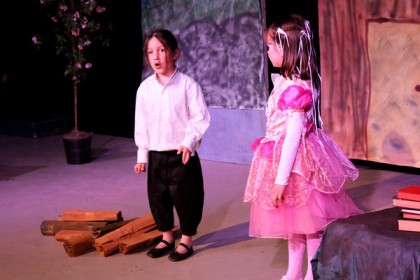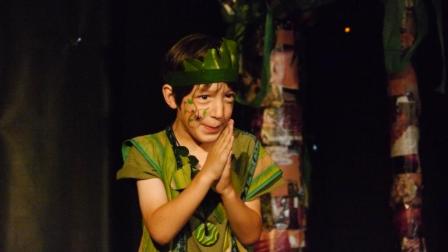I’ve got Shakespeare in the works again. This go around, things will be a little different because we’ll be preparing for the Folger Children’s Festival, where kids at the elementary level perform a twenty-minute Shakespeare something, be it an except, a collection of monologues or a shortened play. We’re going for a short version of MacBeth and this time around I’m looking forward to blood and sword-fighting.
Anyway, I have said here several times that I’d do a more detailed post about all the elements of putting together a Shakespeare production and I told someone recently I’d really do it. So here it is, to remind myself as much as anything. I admit that it got longer than I expected. There are a lot of little tasks in putting together a big production – things like programs that are easy to forget.

Get a Group
First, I have started with my inestimable group of friends and their kids. The first year we did this, we had five and six year-olds, as well as some seven and eight year-olds, doing real Shakespeare. I am still a bit amazed at my own moxie and the trust of my friends and random homeschool acquaintances in letting me try it. As well, at their willingness to help by pitching in with extra money, making programs, putting together sets, making costumes and designing great fairy wings.
Both times, and we’ll do it this way again, we’ve met before we started the play in order to goof off and play some theater games together as well as introduce the play and some Shakespearean language. At the end of those meetings, I cast the play and hand out scripts.
From the first time to the second, I learned something. Kids need to learn their lines before we start rehearsals. Even eight year-olds can’t read lines aloud well enough to properly rehearse and six year-olds are pretty much hopeless at it. Therefore, I highly recommend giving kids a month or more to have a role, let it sink in, and memorize their lines. Make it extremely clear to parents and kids that they are committing to learn those lines and that the whole group is counting on them.
Make Up a Script
There are several places to find shortened Shakespeare. If you do a search, you’ll turn up a number of books. So far, I’ve taken my scripts from Shakespeare with Children by Elizabeth Weinstein. The book shortens six Shakespeare plays. One of the things I like about this version is that they include some of the smaller parts in order to allow for a larger cast where every kid feels important. For example, in The Tempest, the masque scene with the spirits is included and it was a small matter to insert a short line for each of the spirits from the play. I’ve typed up the scripts and removed a few lines here and there to shorten parts, added back language from the original play to beef up others in order to customize it for our particular group.
There are other sources. You can, of course, start with the original yourself and edit away. Do it when you’re feeling especially gutsy. Editing the bard is not for the faint of heart. Alternately, you can search for a free abridged version. This site has a few and I’ve seen others as well.
Play Games
Obviously, once you’ve got a cast and a script and you’re probably tempted to just get to work. However, I’d like to advocate for playing more games. Games warm everyone up and get everyone excited to be there. This may surprise you, but sitting there watching other kids run the same line over and over in a scene you’re not even in isn’t that much fun to kids. That’s part of why games are important. Games can also help young actors learn to project their voices, use their bodies, pay attention to their fellow castmates on stage, and good skills.
The book I have used the most for theater games is On Stage by Lisa Bany-Winters. There are many others though. 101 Drama Games and Activities is a good resource as well. The same series has an improv title with good suggestions. Theater Games for the Classroom is another. I’ve tried to build up a repertoire of quick games for getting started and running around games for blowing off steam and learning to work together.
Rehearse
As I said before, I think it’s essential for kids to know their lines before rehearsals begin. For the director, I think it’s essential that you’ve decided on basic entrances and exits before you begin and have some idea of blocking. In fact, blocking is the theater piece that I’ve seen kids find the most difficult on stage. Basically, going into things, just be aware from rehearsal one that there’s a good chance you’ll be fighting to get most kids to face the audience and not stand in a flat line. The one thing I’ve found useful in helping kids with this is running a dumb show in rehearsals. When we spent a morning doing a dumb show before Midsummer’s Night Dream, some of the scenes came to life that had been the most difficult parts of the play to get through.
Get the Stage and Set It
Both times we’ve performed, we’ve rented a theater with lighting. The first time, it was a black box and the second, it was a church theater space. Many theaters are very small. Don’t underestimate (as I did our first year!) how many family members each cast member may want to bring to the show. Fifty seats or even a hundred sounds like plenty until you realize that each cast member may have half a dozen relatives who want to see them perform. Depending on your group, fifty seats might be fine, but check in first.
If you use a space that isn’t set up as a theater, theater supply stores may rent lighting at a reasonable cost. That’s an alternate option. You can also, of course, simply perform in an open space without lighting. I’ve just found that kids feel a great sense of pride at being in front of an audience on a more traditional stage.
We’ve used various things to create our staging. In The Tempest, potted plants, fake vines and old ottomans disguised as rocks made a simple set. The backdrops were just abstract paintings on old sheets. In Midsummer’s, the kids constructed fake trees and decorated old chairs to become thrones. Because of the festival we’re participating in, we’ll have minimal set pieces this time. You can get elaborate and build flats or keep things as simple as possible. In the first go around, the kids contributed, but didn’t do the bulk of the work. Most things came from thrift stores. The second time around, I made the design and conception, then asked the kids to carry it out in their own way by painting the tops of the thrones and so forth. Most things came from creative reuse centers.
Costumes
Both costumes and sets can be assigned to different people. Directors don’t have to do it all, of course. The first time around, kids got guidelines for their costumes, but parents were mostly expected to get them themselves. The second time around, I had volunteers putting together costumes and we only asked parents to send kids with certain things, such as leggings for the fairies. We kept it pretty simple. Also consider how face painting can help, even if it’s just by giving a couple of kids beards.
It probably goes without saying, but doing a dress rehearsal before the show will reveal both costume issues as well as last minute staging issues, especially if it’s the case that you haven’t been able to rehearse in your theater space.

Perform!
At this stage, little extras are fun. Printing up tickets and making a program lends an air of professionalism to what you’re doing. We’ve put the kids’ artwork onto the programs both times, which is fun. You can also include quotes from the kids about their experiences or mini-bios of the kids with headshots.
Be sure that during rehearsals, you’ve given enough time to practicing taking bows. This is one of those things that seems like it would be easy, but both shows have required that I come on stage and drag kids into position despite plenty of practice. I think their brains turn off when it’s time for a bow.
Celebrate
Don’t neglect to hold a cast party after the show or find another time for the kids to celebrate the hard work they’ve done. It doesn’t have to be elaborate. I think it’s just nice to give the kids a chance to blow off steam and receive their due compliments after the show.




